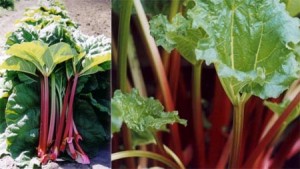Rhubarb is a plant. The root and underground stem (rhizome) are used to make medicine.
Contents
Uses
- Used today in both “conventional and herbal medicine
-
Key actions
- Laxative
- Anti-inflammatory
- Astringent
- Stops bleeding
- Antibacterial
Benefits
- Rhubarb is used primarily for digestive complaints including constipation, diarrhea, heartburn, stomach pain, gastrointestinal (GI) bleeding, and preparation for certain GI diagnostic procedures. Some people use rhubarb so they have to strain less during bowel movements; this reduces pain from haemorrhoids or tears in the skin lining the anal canal (anal fissures).
- Rhubarb is sometimes applied to the skin to treat cold sores.
- In food, rhubarb stems are eaten in pie and other recipes. Rhubarb is also used as a flavoring agent.
Cautions
- Children: Rhubarb is POSSIBLY UNSAFE for children. There is one report of a 4-year-old who ate rhubarb leaves and died. Rhubarb leaves contain a lot of oxalic acid, which can be deadly if taken in large enough doses. Because of their small size, children are at highest risk for oxalic poisoning after eating rhubarb leaves.
- Pregnancy and breast-feeding: Rhubarb is POSSIBLY UNSAFE when used in amounts greater than those found in foods.
- Diarrhea or constipation: Rhubarb can make diarrhea or constipation worse, depending on the preparation used.
- Gastrointestinal (GI) conditions: Don’t take rhubarb if you have a bowel obstruction; appendicitis; unexplained stomach pain; or inflammatory conditions of the intestines including Crohn’s disease, colitis, and irritable bowel syndrome (IBS).
- Kidney disease: There is a chemical in rhubarb that might harm the kidneys. In fact, a supplement that contained rhubarb has been linked to one report of kidney failure. If you already have kidney disease, don’t risk making it worse by taking rhubarb.
- Kidney stones: Rhubarb contains a chemical that the body can convert into kidney stones. If you have ever had kidney stones, don’t take rhubarb.
- Liver problems: Rhubarb can make liver function worse in people who already have liver problems. People who have liver problems should avoid rhubarb.
Interactions
- Digoxin (Lanoxin) interacts with RHUBARB
Rhubarb is a type of laxative called a stimulant laxative. Stimulant laxatives can decrease potassium levels in the body. Low potassium levels can increase the risk of side effects of digoxin (Lanoxin). - Medications for inflammation (Corticosteroids) interacts with RHUBARB
Some medications for inflammation can decrease potassium in the body. Rhubarb is a type of laxative that might also decrease potassium in the body. Taking rhubarb along with some medications for inflammation might decrease potassium in the body too much.Some medications for inflammation include dexamethasone (Decadron), hydrocortisone (Cortef), methylprednisolone (Medrol), prednisone (Deltasone), and others. - Medications taken by mouth (Oral drugs) interacts with RHUBARB
Rhubarb is a laxative. Laxatives can decrease how much medicine your body absorbs. Decreasing how much medicine your body absorbs can decrease the effectiveness of your medication. - Medications that can harm the kidneys (Nephrotoxic Drugs) interacts with RHUBARB
Taking rhubarb might harm the kidneys in some people. Some medications can also harm the kidneys. Taking rhubarb with medications that can harm the kidneys might increase the chance of kidney damage.Some of these medications that can harm the kidneys include cyclosporine (Neoral, Sandimmune); aminoglycosides including amikacin (Amikin), gentamicin (Garamycin, Gentak, others), and tobramycin (Nebcin, others); nonsteroidal anti-inflammatory drugs (NSAIDs) including ibuprofen (Advil, Motrin, Nuprin, others), indomethacin (Indocin), naproxen (Aleve, Anaprox, Naprelan, Naprosyn), piroxicam (Feldene); and numerous others. - Stimulant laxatives interacts with RHUBARB
Rhubarb is a type of laxative called a stimulant laxative. Stimulant laxatives speed up the bowels. Taking rhubarb along with other stimulant laxatives could speed up the bowels too much and cause dehydration and low minerals in the body.Some stimulant laxatives include bisacodyl (Correctol, Dulcolax), cascara, castor oil (Purge), senna (Senokot), and others. - Warfarin (Coumadin) interacts with RHUBARB
Rhubarb can work as a laxative. In some people rhubarb can cause diarrhea. Diarrhea can increase the effects of warfarin and increase the risk of bleeding. If you take warfarin do not to take excessive amounts of rhubarb. - Water pills (Diuretic drugs) interacts with RHUBARB
Rhubarb is a laxative. Some laxatives can decrease potassium in the body. “Water pills” can also decrease potassium in the body. Taking rhubarb along with “water pills” might decrease potassium in the body too much.Some “water pills” that can decrease potassium include chlorothiazide (Diuril), chlorthalidone (Thalitone), furosemide (Lasix), hydrochlorothiazide (HCTZ, HydroDiuril, Microzide), and others.
Other names
Chinese Rhubarb, Da Huang, Garden Rhubarb, Himalayan Rhubarb, Indian Rhubarb, Medicinal Rhubarb, Radix et Rhizoma Rhei, Rewandchini, Rhei, Rhei Radix, Rheum australe, Rheum emodi, Rheum officinale, Rheum palmatum, Rheum tanguticum, Rhubarbe, Rhubarbe de Chine, Rhubarbe Indienne, Rhubarbe Médicinale, Rhubarbe Palmée, Rhubarbe Potagère, Rhubarbe Turque, Ruibarbo, Tai Huang, Turkey Rhubarb
References
Source:WebMD, http://www.webmd.com/vitamins-supplements/ingredientmono-214-rhubarb.aspx?activeingredientid=214&activeingredientname=rhubarb
Wikipedia, https://en.wikipedia.org/wiki/Rheum_palmatum

